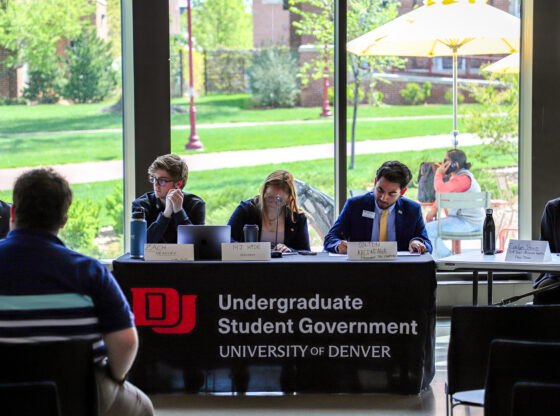The USG Sustainability Committee (SUSCOM) had an “Uproot Day” last Saturday, April 26, to dig up and transplant the permaculture garden from the west side of Cherrington Hall to West High School downtown. The garden was transplanted to make room for construction on the new Anna and John J. Sie International Relations Complex.
“The garden needs to be saved after so much work and money was put into it,” said Chelsea Warren, student manager of the Center for Sustainability. “Not all of the plants will survive the transplant. It’s pretty traumatizing for them.”
According to Warren, transplant experts showed volunteers how to dig up the garden without damaging the roots of the plants. Then the plants were wrapped in burlap, soaked in water and transported to West High School to be replanted. About 30 volunteers, including four or five transplant experts, showed up on Saturday. The principal and several faculty members of West High School showed up as well.
The uprooting ended at 11:30 a.m. because there were too many plants to fit in the U-Haul, according to Warren. Since the last frost has not happened yet, the volunteers did not attempt to transplant any large sprouting bushes or trees. Instead they removed smaller plants, including green onions, various herbs, berry bushes and more.
“It really sucks from our end because the permaculture was about to be self-sufficient,” said Dan Powell, chair of SUSCOM. “I think it was started in 2006.”
According to Warren, the new Korbel building will not actually expand into the space where the permaculture garden was, but the construction materials and equipment will have to go in that space during the construction process.
Warren said the sustainability community is also losing the xeriscape garden and the community bridge garden, both on High Street, because the university has sold those plots to developers.
In response to the loss of gardens on campus, the Center for Sustainability has developed a Garden Network proposal to put in front of groups such as USG, GSG, Administration Council and Facilities Management. According to Warren, USG passed the Garden Network resolution last week.
“The Garden Network is a proposal for new garden spaces,” said Warren. “It developed because no one knows where to go if they want to work in gardens. There are people out there who are interested, it’s just a matter of compiling them.”
According to Warren, there will be a new community garden behind Boettcher West, and a new garden in the permaculture garden space after the Korbel construction is done. She said part of the Garden Network proposal is figuring out what other places on campus would work for gardens.
Warren emphasized the gardens’ connections to academics, wellness and community. She said that a garden is the ultimate living laboratory and a good place for experiential learning. She added that it is healthy to work outside and de-stress, and that gardens provide a good space for meeting people and hosting events.
“It needs to be a part of the curriculum and the student body,” said Warren. “I would like to see regular volunteers and classes that go out there. It would just get bigger as the interest grew, but we don’t have that foundation.”
Warren added that the loss of the current gardens was unfortunate, but it was an opportunity to revive the interest in gardens on campus.
“At the end of the day it sucks, and I know some people in the garden community who just want to chain themselves to the gardens, but the gardens are going away and there’s nothing we can do about it,” said Warren. “This is a good opportunity to get people more involved in the gardens and revitalize them.”
Powell agreed that the loss of the gardens will be an opportunity for the garden community on campus.
“This is a good opportunity for us to go ask for more,” said Powell. “I loved the permaculture garden and I invested a lot of time into it, but what we’re about to have is way better. It works with the systemic nature of the university. As we build a lot of new buildings, we’ll do something new with the grounds.”











